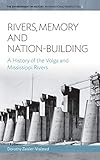Rivers, Memory, And Nation-building : A History of the Volga and Mississippi Rivers / Dorothy Zeisler-Vralsted.
Material type: TextSeries: Environment in History: International Perspectives ; 5Publisher: New York ; Oxford : Berghahn Books, [2014]Copyright date: ©2014Description: 1 online resource (204 p.)Content type:
TextSeries: Environment in History: International Perspectives ; 5Publisher: New York ; Oxford : Berghahn Books, [2014]Copyright date: ©2014Description: 1 online resource (204 p.)Content type: - 9781782384311
- 9781782384328
- Collective memory -- Russia -- History
- Collective memory -- United States -- History
- Human ecology -- Russia -- History
- Human ecology -- United States -- History
- Nationalism -- Russia -- History
- Nationalism -- United States -- History
- Rivers -- Social aspects -- Russia
- Rivers -- Social aspects -- United States
- HISTORY / Historical Geography
- History (General), Environmental Studies (General), Memory Studies
- 947/.4 23
- DK511.V65 .Z457 2015eb
- online - DeGruyter
| Item type | Current library | Call number | URL | Status | Notes | Barcode | |
|---|---|---|---|---|---|---|---|
 eBook
eBook
|
Biblioteca "Angelicum" Pont. Univ. S.Tommaso d'Aquino Nuvola online | online - DeGruyter (Browse shelf(Opens below)) | Online access | Not for loan (Accesso limitato) | Accesso per gli utenti autorizzati / Access for authorized users | (dgr)9781782384328 |
Frontmatter -- Contents -- Illustrations -- Preface -- Introduction -- Chapter 1 The Early Years -- Chapter 2 Rivers as Nation-Builders -- Chapter 3 Rivers and Modernization -- Chapter 4 Moscow: A Port to Five Seas -- Chapter 5 Navigating the Mississippi -- Epilogue -- Selected Bibliography -- Index
restricted access online access with authorization star
http://purl.org/coar/access_right/c_16ec
Rivers figure prominently in a nation’s historical memory, and the Volga and Mississippi have special importance in Russian and American cultures. Beginning in the pre-modern world, both rivers served as critical trade routes connecting cultures in an extensive exchange network, while also sustaining populations through their surrounding wetlands and bottomlands. In modern times, “Mother Volga” and the “Father of Waters” became integral parts of national identity, contributing to a sense of Russian and American exceptionalism. Furthermore, both rivers were drafted into service as the means to modernize the nation-state through hydropower and navigation. Despite being forced into submission for modern-day hydrological regimes, the Volga and Mississippi Rivers persist in the collective memory and continue to offer solace, recreation, and sustenance. Through their histories we derive a more nuanced view of human interaction with the environment, which adds another lens to our understanding of the past.
Mode of access: Internet via World Wide Web.
In English.
Description based on online resource; title from PDF title page (publisher's Web site, viewed 25. Jun 2024)


